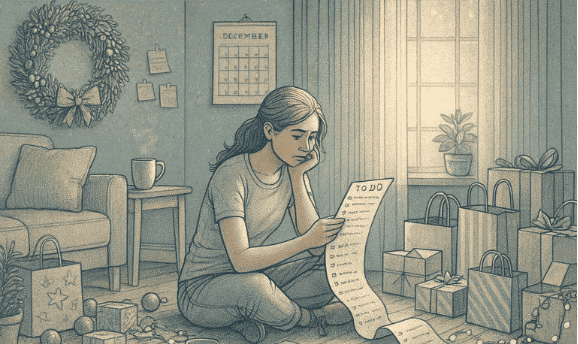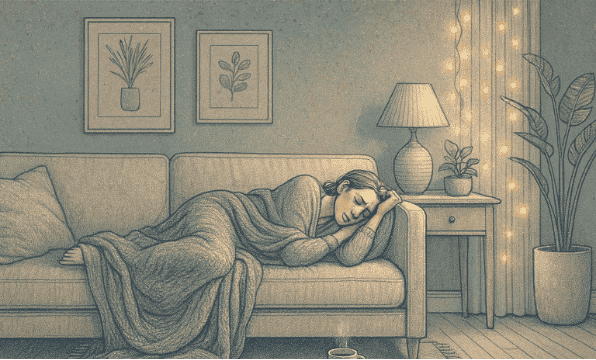Key Takeaways
- Holiday stress often stems from financial pressure, complicated family dynamics, overwhelming social obligations, and disrupted routines, all of which can strain mental health.
- Stress during the holidays can manifest as anxiety, depression, and physical symptoms like fatigue, headaches, and digestive issues, making it both a mental and physical challenge.
- Coping strategies such as setting boundaries, maintaining core routines, managing finances wisely, and seeking healthy connections can significantly reduce the negative impact of holiday stress.
- Prioritizing self-care through rest, balanced nutrition, limited alcohol use, and self-compassion helps protect your mental well-being and makes the season more manageable.
- A Mission For Michael (AMFM) provides comprehensive mental health treatment programs that help individuals get through seasonal stress, develop healthy coping skills, and maintain their mental wellness throughout the holidays and beyond.
Understanding Holiday Stress and Mental Health
The holiday season often brings images of joy, celebration, and togetherness. Yet for many people, this time of year creates significant stress that affects mental health. The pressure to create perfect experiences, figure out complicated family relationships, manage tight budgets, and maintain endless social obligations can feel overwhelming.
Holiday stress isn’t a sign of weakness. It’s a real response to genuine challenges that intensify during this time of year. Understanding why the holidays affect mental health and learning effective coping strategies can help you through the season with greater ease and protect your well-being.
Founded in 2010, A Mission For Michael (AMFM) offers specialized mental health care across California, Minnesota, and Virginia. Our accredited facilities provide residential and outpatient programs, utilizing evidence-based therapies such as CBT, DBT, and EMDR.
Our dedicated team of licensed professionals ensures every client receives the best care possible, supported by accreditation from The Joint Commission. We are committed to safety and personalized treatment plans.
Why the Holidays Trigger Mental Health Challenges
Financial Pressure and Expectations
Money worries intensify during the holidays. The pressure to buy gifts, host gatherings, travel to see family, and create memorable experiences adds up quickly. Many people feel caught between their financial reality and the expectations they perceive from others about what the holidays should look like.
This financial stress creates anxiety, guilt, and shame that can weigh heavily on your mental health. Worrying about money while trying to appear cheerful and generous creates internal conflict that’s exhausting to maintain.
Family Dynamics and Relationships
Family gatherings can bring up complicated emotions and old patterns. You might face criticism, judgment, or questions about your life choices. Unresolved conflicts may resurface, and being around relatives who don’t understand or support you can feel draining.
For some, family gatherings mean confronting difficult relationships or managing behavior from family members that affects your peace of mind. The expectation to maintain harmony while suppressing your own feelings creates significant mental strain.
Social Obligations and Overwhelm
The calendar fills quickly with parties, events, and gatherings. While some socializing brings joy, the sheer volume of obligations during the holidays can feel suffocating. Trying to tend to everything while managing work and personal needs leaves little time for rest.
The pressure to appear cheerful at every event, even when you’re exhausted or struggling, adds another layer of stress. For people who find social situations draining, the constant stream of gatherings can severely impact mental health.

Holiday stress stems from multiple sources, including financial pressure, family dynamics, and excessive social obligations.
Grief, Loss, and Loneliness
The holidays can amplify feelings of grief and loss. Missing someone who has passed away feels more acute when traditions highlight their absence. For those who have experienced recent loss or life changes, the season’s emphasis on togetherness can intensify loneliness and sadness.
Not everyone has family to spend the holidays with, and the cultural messaging about family togetherness can make isolation feel even more painful. Watching others celebrate while feeling alone creates a specific kind of holiday sadness that affects mental health deeply.
Disrupted Routines and Self-Care
The holiday season disrupts the routines that normally support mental health. Sleep schedules change, exercise routines get dropped, and healthy eating habits often fall away. The very practices that help manage stress become difficult to maintain when schedules are packed.
When the foundations of your mental health routine crumble, you’re left more vulnerable to stress, anxiety, and low mood. Without your usual coping mechanisms in place, holiday pressures feel even more overwhelming.
How Holiday Stress Affects Your Mental Health
Anxiety and Worry
Holiday stress often manifests as increased anxiety. You might experience racing thoughts about everything that needs to get done, worry about family interactions, or feel panic about finances. Physical symptoms like tension, restlessness, and trouble sleeping can accompany these worried thoughts.
The constant mental checklist of tasks keeps your nervous system in an activated state. This ongoing anxiety drains your energy and makes it harder to enjoy any part of the season.
Depression and Sadness
For some people, the holidays trigger or worsen depression. The contrast between cultural expectations of joy and your internal experience of sadness creates painful dissonance. You might feel empty, hopeless, or disconnected even while surrounded by celebration.
Low energy, loss of interest in activities, and persistent sadness can all intensify during the holiday season. The pressure to hide these feelings and appear happy makes depression feel even more isolating.
Physical Symptoms of Holiday Stress
Mental health struggles during the holidays often show up in your body. Headaches, digestive issues, muscle tension, fatigue, and changes in appetite are common. Sleep problems, whether insomnia or sleeping too much, frequently accompany holiday stress.
These physical symptoms create a feedback loop where feeling physically unwell makes mental health worse, and poor mental health intensifies physical discomfort.

Holiday stress affects both mental and physical health through anxiety, depression, and stress-related physical symptoms.
Practical Coping Strategies for Holiday Mental Health
Setting Boundaries and Managing Expectations
One of the most powerful tools for managing holiday stress is the ability to say no. You don’t have to attend every event, buy gifts for everyone, or meet others’ expectations about how you should celebrate. Decide what matters most to you and let go of the rest.
Setting boundaries with family members about topics you won’t discuss, behaviors you won’t tolerate, or the length of your visits protects your mental health. Boundaries aren’t selfish; they’re necessary for maintaining your wellbeing.
Maintaining Your Routines
Even when schedules get hectic, try to maintain the core routines that support your mental health. Keep your regular sleep schedule as much as possible, continue any exercise habits, and protect time for activities that help you decompress.
If you can’t maintain your full routine, do scaled-down versions. A short walk is better than no movement. Ten minutes of quiet time is better than none. These small acts of self-care help buffer against holiday stress.
Staying Connected in Healthy Ways
While excessive socializing can be draining, a genuine connection with supportive people helps manage stress. Reach out to friends or family members who understand you. Having even one person you can be honest with about your struggles makes a significant difference.
If the holidays intensify feelings of loneliness, look for community events, volunteer opportunities, or support groups where you can connect with others in meaningful ways.
Managing Financial Stress
Create a realistic budget before the season begins and stick to it. Thoughtful, modest gifts often mean more than expensive ones. Consider suggesting alternative gift-giving arrangements like drawing names or setting spending limits.
Being honest with loved ones about financial limitations reduces stress and often brings relief to others facing similar pressures.
Caring for Yourself During the Season
Prioritize basics like sleep, nutrition, and movement even when schedules are packed. Limit alcohol consumption, which can worsen anxiety and depression. Build in quiet time for yourself, even if it’s just fifteen minutes of solitude each day.
Practice self-compassion when things don’t go perfectly. Give yourself permission to feel whatever emotions arise without judgment; it’s okay to struggle during a season that’s supposed to be joyful.
Why Choose AMFM for Mental Health Support

AMFM offers comprehensive mental health support in comfortable, healing environments throughout the year, including during challenging holiday seasons.
At AMFM, we understand that mental health challenges don’t take a holiday break. Our comprehensive treatment programs provide support when you need it most, helping you develop skills to manage stress, understand difficult emotions, and protect your mental wellness year-round.
Our residential programs offer a therapeutic environment where you can step away from holiday pressures and focus entirely on your mental health. Through evidence-based therapies including cognitive behavioral therapy, mindfulness training, and specialized interventions, you’ll learn practical strategies for managing stress and building resilience.
For individuals needing intensive daily support while maintaining some flexibility, our partial hospitalization programs provide comprehensive treatment with evening hours at home. These programs are particularly effective for learning to apply coping strategies in real-world situations, including navigating challenging family dynamics.
Our outpatient programs serve those who want to continue their responsibilities while receiving ongoing mental health support. These programs help you maintain progress and prevent holiday stress from overwhelming your mental health.
We recognize that family relationships often contribute to holiday stress. Our family support and education programs help families understand mental health challenges and develop healthier communication patterns that benefit everyone.
With facilities in California, Virginia, Minnesota, and Washington state, AMFM provides evidence-based treatment in comfortable, supportive environments. We work with most major insurance providers and make beginning treatment straightforward through comprehensive insurance verification and personalized treatment planning.
Frequently Asked Questions (FAQ)
Is it normal to feel depressed during the holidays?
Yes, many people experience increased sadness, anxiety, or depression during the holiday season. The combination of stress, disrupted routines, financial pressure, complicated family dynamics, and grief can trigger or worsen mental health symptoms. You’re not alone in finding this time of year difficult.
How can I handle family gatherings when they trigger my anxiety?
Set clear boundaries about the length of your visit, have an exit plan if you need to leave early, and identify a supportive person you can check in with during the event. It’s also okay to decline invitations that you know will be harmful to your mental health.
What should I do if I can’t afford therapy during the holiday season?
Many communities offer sliding-scale therapy options, support groups, or crisis services that are free or low-cost. At AMFM, we work with most major insurance providers to make treatment accessible, and our team can help you explore your coverage options.
Can holiday stress cause long-term mental health problems?
While temporary holiday stress usually resolves after the season ends, repeated severe stress or unaddressed mental health symptoms can have lasting effects. Learning healthy coping strategies and seeking support when needed helps prevent temporary stress from becoming chronic.
How does AMFM help people manage holiday-related mental health struggles?
AMFM’s programs teach practical skills for managing stress, setting boundaries, and maintaining mental wellness during challenging times. Through therapy and comprehensive support, individuals learn to figure out difficult situations while protecting their mental health throughout the year.







